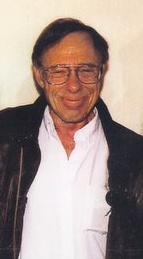
Robert Sheckley
July 16, 1928
New York City, U.S.
December 9, 2005 (aged 77)
Poughkeepsie, New York, U.S.
Writer
American
1952–2005
Science fiction, fantasy, mystery
Nominated for Hugo and Nebula Awards, Sheckley was named Author Emeritus by the Science Fiction and Fantasy Writers of America in 2001.
Biography[edit]
Sheckley was born to a Jewish family in Brooklyn, New York City. In 1931, the family moved to Maplewood, New Jersey. Sheckley attended Columbia High School, where he discovered science fiction. He graduated in 1946[2] and hitchhiked to California the same year, where he tried numerous jobs: landscape gardener, pretzel salesman, barman, milkman, warehouseman, and general laborer "board man" in a hand-painted necktie studio. Finally, still in 1946, he joined the U.S. Army and was sent to Korea.[3] During his time in the army, he served as a guard, an army newspaper editor, a payroll clerk, and as a guitarist in the Army Band. He left the service in 1948.[4]
Sheckley graduated with an arts degree from New York University in 1951.[5] The same year he married, for the first time, to Barbara Scadron. The couple had one son, Jason. Sheckley worked in an aircraft factory and as an assistant metallurgist for a short time, but his breakthrough came quickly: in late 1951, he sold his first story, "Final Examination," to Imagination magazine. He quickly gained prominence as a writer, publishing stories in Imagination, Galaxy, and other science fiction magazines. The 1950s saw the publication of Sheckley's first four books: short story collections Untouched by Human Hands (Ballantine, 1954), Citizen in Space (1955), and Pilgrimage to Earth (Bantam, 1957), and a novel, Immortality, Inc. (first published as a serial in Galaxy, 1958).
Sheckley and Scadron divorced in 1956. The writer married journalist Ziva Kwitney in 1957. The newly married couple lived in Greenwich Village. Their daughter, Alisa Kwitney, born in 1964, would herself become a successful writer. Applauded by critic Kingsley Amis, Sheckley was now selling many of his deft, satiric stories to mainstream magazines such as Playboy. In addition to his science fiction stories, in the 1960s Sheckley started writing suspense fiction. More short story collections and novels appeared in the 1960s, and a film adaptation of an early story by Sheckley, The 10th Victim, was released in 1965.
Sheckley spent much of 1970s living on Ibiza. He and Kwitney divorced in 1972 and the same year Sheckley married Abby Schulman, whom he had met in Ibiza. The couple had two children, Anya and Jed. The couple separated while living in London. In 1980, the writer returned to the United States and became fiction editor of the newly established OMNI magazine.[6] Sheckley left OMNI in 1981 with his fourth wife, writer Jay Rothbell: they subsequently traveled widely in Europe, finally ending up in Portland, Oregon, where they separated. He married Gail Dana of Portland in 1990. Sheckley continued publishing further science fiction and espionage or mystery stories, and collaborated with other writers such as Roger Zelazny and Harry Harrison.
During an April 2005 visit to Ukraine for the Ukrainian Sci-Fi Computer Week, an international event for science fiction writers, Sheckley fell ill and had to be hospitalized in Kyiv.[7] His condition was very serious for a week, but he appeared to be slowly recovering. Sheckley's official website ran a fundraising campaign to help cover his treatment and his return to the United States. He settled in Red Hook, in northern Dutchess County, New York, to be near his daughters Anya and Alisa. On November 20 he had surgery for a brain aneurysm; he died in a Poughkeepsie hospital on December 9, 2005.
Works[edit]
Sheckley was a prolific and versatile writer. His works include not only original short stories and novels, but also TV series episodes (Captain Video and His Video Rangers), novelizations of works by others (Babylon 5: A Call to Arms, after the film[8][9]), stories in shared universes such as Heroes in Hell, and collaborations with other writers. He was best known for his several hundred short stories,[3] which he published in book form as well as individually. Typical Sheckley stories include "Bad Medicine" (in which a man is mistakenly treated by a psychotherapy machine intended for Martians), "Protection" (whose protagonist is warned of deadly danger unless he avoids the common activity of "lesnerizing", a word whose meaning is not explained), and "The Accountant" (in which a family of wizards learns that their son has been taken from them by a more sinister trade—accountancy). In many stories Sheckley speculates about alternative (and usually sinister) social orders, of which a good example is the story "A Ticket to Tranai" (which tells of a sort of Utopia designed for human nature as it actually is, which turns out to have terrible drawbacks).
Sheckley's early stories include the far future AAA Ace detective agency series. In these tales, the two partners face unusual problems often related to human incompetence or laziness.[10]
In the 1990s, Sheckley wrote a series of three mystery novels featuring detective Hob Draconian, as well as novels set in the worlds of Star Trek: Deep Space Nine and Alien. Before his death Sheckley had been commissioned to write an original novel based on the TV series The Prisoner for Powys Media, but died before completing the manuscript.
His novel Dimension of Miracles is often cited as an influence on Douglas Adams's The Hitchhiker's Guide to the Galaxy, although in an interview for Neil Gaiman's book Don't Panic: The Official Hitchhiker's Guide to the Galaxy Companion, Adams said he had not read it until after writing the Guide.[11]